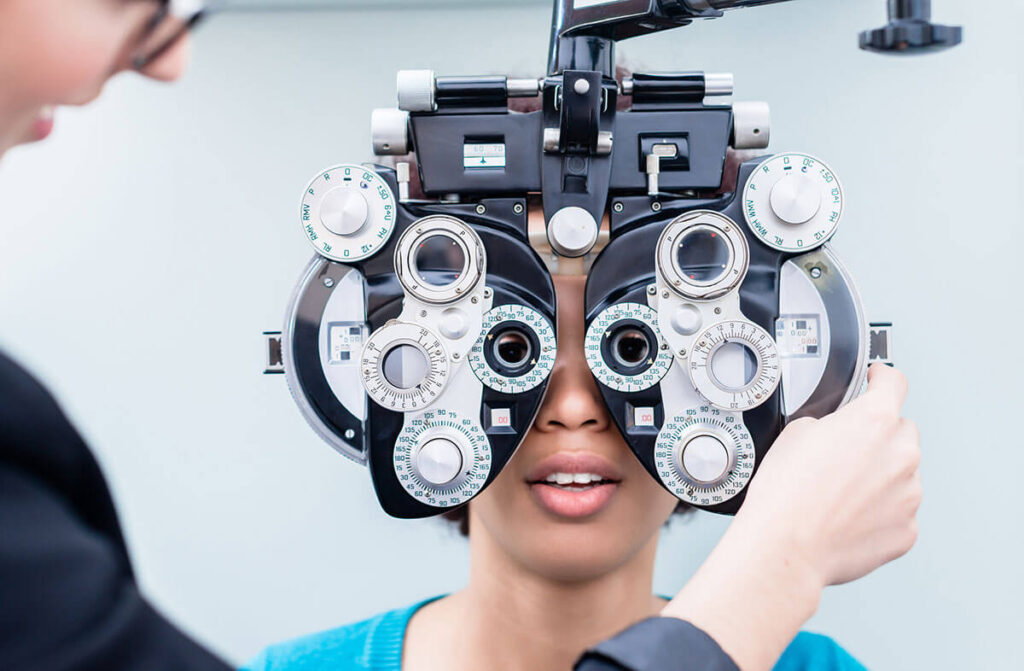The Crucial Role of Eye Exams in Preventing Eye Diseases

Introduction:
Maintaining good eye health is vital for overall well-being, and regular eye exams play a critical role in preventing eye diseases. Eye exams are not just about checking visual acuity; they are comprehensive evaluations performed by eye care professionals to assess the health of your eyes, detect early signs of eye diseases, and implement preventive measures. In this article, we will explore the importance of regularly scheduling eye exams with your optometrist at Southcenter Mall in preventing eye diseases and safeguarding your vision.
Early Detection of Eye Diseases:
One of the key benefits of regular eye exams is the early detection of eye diseases. Many eye diseases, such as glaucoma, macular degeneration, cataracts, and diabetic retinopathy, can develop gradually without noticeable symptoms in the early stages. However, through comprehensive eye exams, eye care professionals can identify subtle changes in the eyes that may indicate the presence of these diseases.
During an eye exam, your eye care professional will perform various tests to evaluate the health of your eyes. These may include visual acuity testing, intraocular pressure measurement, visual field testing, and imaging techniques like retinal photography or optical coherence tomography (OCT). These tests help identify any abnormalities or signs of eye diseases, allowing for early intervention and treatment.
Timely Treatment and Management:
Detecting eye diseases in their early stages is crucial because it allows for prompt treatment and management. Many eye diseases, if left untreated, can lead to irreversible vision loss or even blindness. However, when detected early, appropriate interventions can be initiated to slow down disease progression and preserve vision.
Eye exams enable eye care professionals to develop personalized treatment plans based on the specific condition and its severity. They may recommend various interventions, including medications, lifestyle modifications, dietary changes, or surgical procedures, depending on the nature of the eye disease. Regular follow-up eye exams allow for monitoring the effectiveness of the treatment and making any necessary adjustments to ensure optimal outcomes.
Preventive Measures and Risk Factor Assessment:
Eye exams not only detect existing eye diseases but also help assess your risk factors for developing future eye conditions. Certain factors, such as family history, age, systemic health conditions, and lifestyle choices, can increase the likelihood of developing certain eye diseases. During an eye exam, your eye care professional will inquire about these factors and conduct additional tests or evaluations to determine your risk profile.
Based on the assessment of your risk factors, eye care professionals can recommend preventive measures to minimize the chances of developing eye diseases. These measures may include lifestyle modifications like quitting smoking, adopting a healthy diet rich in nutrients beneficial for eye health, wearing appropriate eye protection, and managing systemic health conditions effectively.
Education and Awareness:
Eye exams provide an opportunity for education and awareness regarding eye diseases and their risk factors. Eye care professionals can explain the importance of regular eye exams, the significance of specific tests and evaluations, and the potential consequences of untreated eye diseases. They can also discuss the symptoms to watch out for and encourage proactive eye care behaviors.
Through education and awareness, eye care professionals empower individuals to take control of their eye health and make informed decisions. This knowledge can lead to early recognition of symptoms, prompt scheduling of eye exams, and better adherence to preventive measures.
Lifestyle Counseling for Eye Health:
Eye exams also offer an ideal platform for eye care professionals to provide lifestyle counseling to promote eye health. They can provide guidance on healthy visual habits, such as proper lighting, maintaining appropriate viewing distances, taking regular breaks during extended screen use, and practicing good eye hygiene.
Additionally, eye care professionals can counsel patients on the importance of maintaining overall health and well-being to support eye health. They can discuss the benefits of regular exercise, a balanced diet, managing chronic health conditions, and protecting the eyes from harmful ultraviolet (UV) radiation.
Conclusion:
Regular eye exams are essential for preventing eye diseases and preserving vision. These comprehensive evaluations conducted by eye care professionals allow for early detection of eye diseases, prompt treatment and management, assessment of risk factors, implementation of preventive measures, education and awareness, and lifestyle counseling for optimal eye health. By prioritizing regular eye exams, you take proactive steps toward safeguarding your vision and maintaining healthy eyes throughout your life. Schedule your next eye exam today and invest in the well-being of your eyes.





